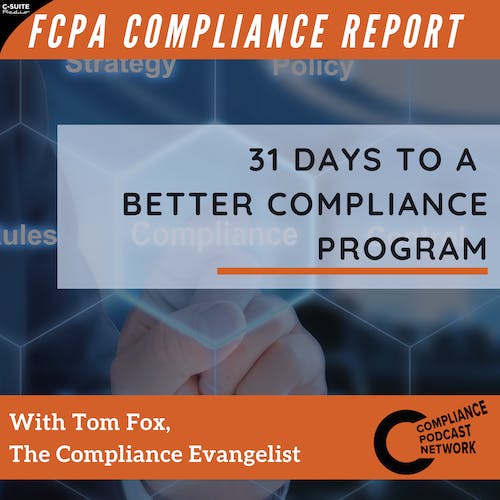Listen "One Month to More Effective Internal Controls-Code of Conduct as an Internal Control"
Episode Synopsis
In 2016, one of the most interesting non-international-focused FCPA enforcement actions was announced by the SEC. It involved a clear quid pro quo benefit paid out by United Airlines, Inc. to David Samson, the former chairman of the Board of Directors of the Port Authority of New York and New Jersey, the public government entity which has authority over, among other things, United’s operations at the company’s huge east coast hub at Newark, New Jersey.
At the time, United’s Code of Conduct prohibited “United employees from directly or indirectly making bribes, kickbacks or other improper payments to government officials, civil servants or anyone else to influence their acts or decisions” and that “[n]o gift may be offered or accepted if it will create a feeling of obligation, compromise judgment or appear to improperly influence the recipient.” Only the United Board of Director’s could grant a waiver to the code and none was sought or obtained by Smisek. The Order concluded, “The [Chairman’s] Route was initiated in violation of United’s policies.”
The company was also sanctioned for not having internal controls in place to prevent such actions as those taken by Smisek, with the SEC also finding this was a violation of Section 13. This was in the face of detailing the protocol for United instituting or reinstituting a route. The Order stated, “In particular, United had insufficient internal accounting controls in place to prevent approval of the South Carolina Route in derogation of United’s Policies.” All the underlying facts, enforcement theories and remediation points towards the failure of internal controls when domestic bribery corruption occurs.
Three key takeaways:
1. It is very unusual for the FCPA to form the basis of a domestic bribery violation.
2. A Code of Conduct can be an internal control.
3. Even a CEO must follow internal controls.
For more information on how to build out a best practices compliance program, including internal controls, check out The Compliance Handbook, 3rd edition.
Learn more about your ad choices. Visit megaphone.fm/adchoices
At the time, United’s Code of Conduct prohibited “United employees from directly or indirectly making bribes, kickbacks or other improper payments to government officials, civil servants or anyone else to influence their acts or decisions” and that “[n]o gift may be offered or accepted if it will create a feeling of obligation, compromise judgment or appear to improperly influence the recipient.” Only the United Board of Director’s could grant a waiver to the code and none was sought or obtained by Smisek. The Order concluded, “The [Chairman’s] Route was initiated in violation of United’s policies.”
The company was also sanctioned for not having internal controls in place to prevent such actions as those taken by Smisek, with the SEC also finding this was a violation of Section 13. This was in the face of detailing the protocol for United instituting or reinstituting a route. The Order stated, “In particular, United had insufficient internal accounting controls in place to prevent approval of the South Carolina Route in derogation of United’s Policies.” All the underlying facts, enforcement theories and remediation points towards the failure of internal controls when domestic bribery corruption occurs.
Three key takeaways:
1. It is very unusual for the FCPA to form the basis of a domestic bribery violation.
2. A Code of Conduct can be an internal control.
3. Even a CEO must follow internal controls.
For more information on how to build out a best practices compliance program, including internal controls, check out The Compliance Handbook, 3rd edition.
Learn more about your ad choices. Visit megaphone.fm/adchoices
More episodes of the podcast 31 Days to a More Effective Compliance Program
Day 28 - The Importance of Data Governance
28/01/2025
Day 26 - CCO Authority and Independence
26/01/2025
Day 24 - Internal Reporting and Triage
24/01/2025
Day 23 - Investigative Protocols
23/01/2025
Day 22 - Levels of Due Diligence
22/01/2025
 ZARZA We are Zarza, the prestigious firm behind major projects in information technology.
ZARZA We are Zarza, the prestigious firm behind major projects in information technology.
